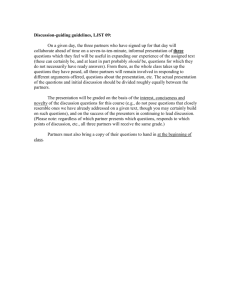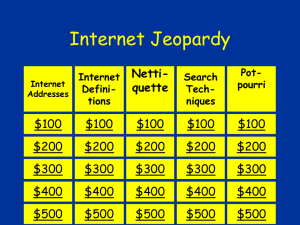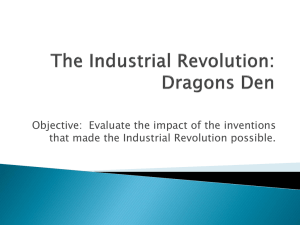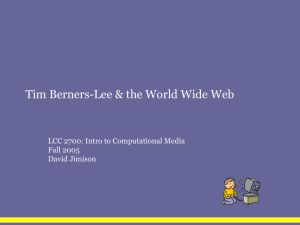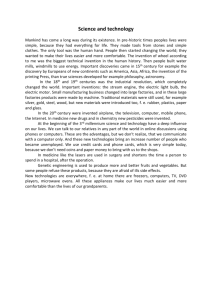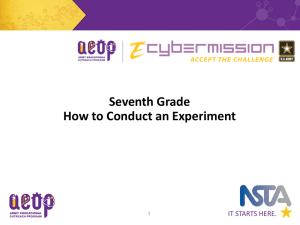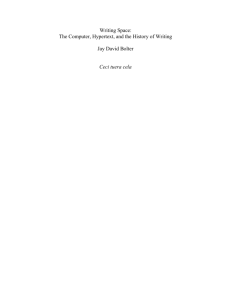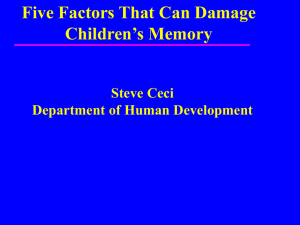The Future of the Book
advertisement
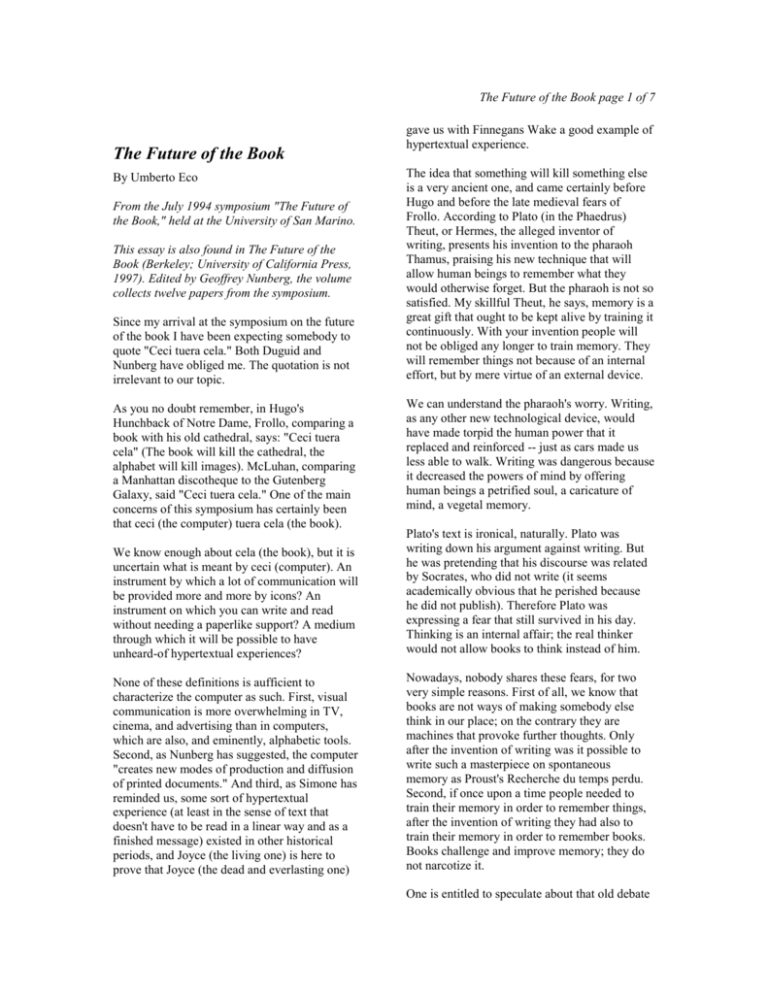
The Future of the Book page 1 of 7 The Future of the Book By Umberto Eco From the July 1994 symposium "The Future of the Book," held at the University of San Marino. This essay is also found in The Future of the Book (Berkeley; University of California Press, 1997). Edited by Geoffrey Nunberg, the volume collects twelve papers from the symposium. Since my arrival at the symposium on the future of the book I have been expecting somebody to quote "Ceci tuera cela." Both Duguid and Nunberg have obliged me. The quotation is not irrelevant to our topic. As you no doubt remember, in Hugo's Hunchback of Notre Dame, Frollo, comparing a book with his old cathedral, says: "Ceci tuera cela" (The book will kill the cathedral, the alphabet will kill images). McLuhan, comparing a Manhattan discotheque to the Gutenberg Galaxy, said "Ceci tuera cela." One of the main concerns of this symposium has certainly been that ceci (the computer) tuera cela (the book). gave us with Finnegans Wake a good example of hypertextual experience. The idea that something will kill something else is a very ancient one, and came certainly before Hugo and before the late medieval fears of Frollo. According to Plato (in the Phaedrus) Theut, or Hermes, the alleged inventor of writing, presents his invention to the pharaoh Thamus, praising his new technique that will allow human beings to remember what they would otherwise forget. But the pharaoh is not so satisfied. My skillful Theut, he says, memory is a great gift that ought to be kept alive by training it continuously. With your invention people will not be obliged any longer to train memory. They will remember things not because of an internal effort, but by mere virtue of an external device. We can understand the pharaoh's worry. Writing, as any other new technological device, would have made torpid the human power that it replaced and reinforced -- just as cars made us less able to walk. Writing was dangerous because it decreased the powers of mind by offering human beings a petrified soul, a caricature of mind, a vegetal memory. We know enough about cela (the book), but it is uncertain what is meant by ceci (computer). An instrument by which a lot of communication will be provided more and more by icons? An instrument on which you can write and read without needing a paperlike support? A medium through which it will be possible to have unheard-of hypertextual experiences? Plato's text is ironical, naturally. Plato was writing down his argument against writing. But he was pretending that his discourse was related by Socrates, who did not write (it seems academically obvious that he perished because he did not publish). Therefore Plato was expressing a fear that still survived in his day. Thinking is an internal affair; the real thinker would not allow books to think instead of him. None of these definitions is aufficient to characterize the computer as such. First, visual communication is more overwhelming in TV, cinema, and advertising than in computers, which are also, and eminently, alphabetic tools. Second, as Nunberg has suggested, the computer "creates new modes of production and diffusion of printed documents." And third, as Simone has reminded us, some sort of hypertextual experience (at least in the sense of text that doesn't have to be read in a linear way and as a finished message) existed in other historical periods, and Joyce (the living one) is here to prove that Joyce (the dead and everlasting one) Nowadays, nobody shares these fears, for two very simple reasons. First of all, we know that books are not ways of making somebody else think in our place; on the contrary they are machines that provoke further thoughts. Only after the invention of writing was it possible to write such a masterpiece on spontaneous memory as Proust's Recherche du temps perdu. Second, if once upon a time people needed to train their memory in order to remember things, after the invention of writing they had also to train their memory in order to remember books. Books challenge and improve memory; they do not narcotize it. One is entitled to speculate about that old debate The Future of the Book page 2 of 7 every time one meets a new communication tool which pretends or seems to substitute for books. In the course of this symposium, under the rubric of "the future of the book," the following different items have been discussed, and not all of them were concerned with books. 1. Images versus alphabetic culture Our contemporary culture is not specifically image oriented. Take for instance Greek or medieval culture: at those times literacy was reserved to a restricted elite and most people were educated, informed, persuaded (religiously, politically, ethically) though images. Even USA Today, cited by Bolter, represents a balanced mixture of icons and letters, if we compare it with a Biblia Pauperum. We can complain that a lot of people spend their day watching TV and never read a book or a newspaper, and this is certainly a social and educational problem, but frequently we forget that the same people, a few centuries ago, were watching at most a few standard images and were totally illiterate. We are frequently misled by a "mass media criticism of mass media" which is superficial and regularly belated. Mass media are still repeating that our historical period is and will be more and more dominated by images. That was the first McLuhan fallacy, and mass media people have read McLuhan too late. The present and the forthcoming young generation is and will be a computer-oriented generation. The main feature of a computer screen is that it hosts and displays more alphabetic letters than images. The new generation will be alphabetic and not image oriented. We are coming back to the Gutenberg Galaxy again, and I am sure that if McLuhan had survived until the Apple rush to the Silicon Valley, he would have acknowledged this portentous event. Moreover, the new generation is trained to read at an incredible speed. An old-fashioned university professor is today incapable of reading a computer screen at the same speed as a teenager. These same teenagers, if by chance they want to program their own home computer, must know, or learn, logical procedures and algorithms, and must type words and numbers on a keyboard, at a great speed. In the course of the eighties some worried and worrying reports have been published in the United States on the decline of literacy. One of the reasons for the last Wall Street crash (which sealed the end of the Reagan era) was, according to many observers, not only the exaggerated confidence in computers but also the fact that none of the yuppies who were controlling the stock market knew enough about the 1929 crisis. They were unable to deal with a crisis because of their lack of historical information. If they had read some books about Black Thursday they would have been able to make better decisions and avoid many well-known pitfalls. But I wonder if books would have been the only reliable vehicle for acquiring information. Years ago the only way to learn a foreign language (outside of traveling abroad) was to study a language from a book. Now our children frequently learn other languages by listening to records, by watching movies in the original edition, or by deciphering the instructions printed on a beverage can. The same happens with geographical information. In my childhood I got the best of my information about exotic countries not from textbooks but by reading adventure novels (Jules Verne, for instance, or Emilio Salgari or Karl May). My kids very early knew more than I on the same subject from watching TV and movies. The illiteracy of Wall Street yuppies was not only due to an insufficient exposure to books but also to a form of visual illiteracy. Books about the 1929 crisis exist and are still regularly published (the yuppies must be blamed for not having been bookstore goers), while television and the cinema are practically unconcerned with any rigorous revisitation of historical events. One could learn very well the story of the Roman Empire through movies, provided that movies were historically correct. The fault of Hollywood is not to have opposed its movies to the books of Tacitus or of Gibbon, but rather to have imposed a pulp and romance-like version of both Tacitus and Gibbon. The problem with the yuppies is not only that they watch TV instead of reading The Future of the Book page 3 of 7 books; it is that Public Broadcasting is the only place where somebody knows who Gibbon was. Today the concept of literacy comprises many media. An enlightened policy of literacy must take into account the possibilities of all of these media. Educational concern must be extended to the whole of media. Responsibilities and tasks must be carefully balanced. If for learning languages, tapes are better than books, take care of cassettes. If a presentation of Chopin with commentary on compact disks helps people to understand Chopin, don't worry if people do not buy five volumes of the history of music. Even if it were true that today visual communication overwhelms written communication the problem is not to oppose written to visual communication. The problem is how to improve both. In the Middle Ages visual communication was, for the masses, more important than writing. But Chartres cathedral was not culturally inferior to the Imago Mundi of Honorius of Autun. Cathedrals were the TV of those times, and the difference from our TV was that the directors of the medieval TV read good books, had a lot of imagination, and worked for the public benefit (or, at least, for what they believed to be the public benefit). 2. Books versus other supports There is a confusion about two distinct questions: (a) will computers made books obsolete? and (b) will computers make written and printed material obsolete? Let us suppose that computers will make books disappear (I do not think this will happen and I shall elaborate later on this point, but let us suppose so for the sake of the argument). Still, this would not entail the disappearance of printed material. We have seen that it was wishful thinking to hope that computers, and particularly word processors, would have helped to save trees. Computers encourage the production of printed material. We can imagine a culture in which there will be no books, and yet where people go around with tons and tons of unbound sheets of paper. This will be quite unwieldy, and will pose a new problem for libraries. Debray has observed that the fact that Hebrew civilization was a civilization based upon a book is not independent of the fact that it was a nomadic civilization. I think that this remark is very important. Egyptians could carve their records on stone obelisks, Moses could not. If you want to cross the Red Sea, a book is a more practical instrument for recording wisdom. By the way, another nomadic civilization, the Arabic one, was based upon a book, and privileged writing upon images. But books also have an advantage with respect to computers. Even if printed on acid paper, which lasts only seventy years or so, they are more durable than magnetic supports. Moreover, they do not suffer power shortages and blackouts, and are more resistant to shocks. As Bolter remarked, "it is unwise to try to predict technological change more than few years in advance," but it is certain that, up to now at least, books still represent the most economical, flexible, washand-wear way to transport information at a very low cost. Electronic communication travels ahead of you, books travel with you and at your speed, but if you are shipwrecked on a desert island, a book can be useful, while a computer cannot -- as Landow remarks, electronic texts need a reading station and a decoding device. Books are still the best companions for a shipwreck, or for the Day After. I am pretty sure that new technologies will render obsolete many kinds of books, like encyclopedias and manuals. Take for example the Encyclomedia project developed by Horizons Unlimited. When finished it will probably contain more information than the Encyclopedia Britannica (or Treccani or Larousse), with the advantage that it permits cross-references and nonlinear retrieval of information. The whole of the compact disks, plus the computer, will occupy one-fifth of the space occupied by an encyclopedia. The encyclopedia cannot be transported as the CD-ROM can, and cannot be easily updated; it does not have the practical advantages of a normal book, therefore it can be replaced by a CD-ROM, just a phone book can. The shelves today occupied, at my home as well as in public libraries, by meters and meters of encyclopedia volumes could be eliminated in the next age, and there will be no reason to lament their disappearance. For the same reason today I no longer need a heavy portrait painted by an The Future of the Book page 4 of 7 indifferent artist, for I can send my sweetheart a glossy and faithful photograph. Such a change in the social functions of painting has not made painting obsolete, not even the realistic paintings of Annigoni, which do not furfill the function of portraying a person, but of celebrating an important person, so that the commissioning, the purchasing, and the exhibition of such portraits acquire aristocratic connotations. Books will remain indispensable not only for literature, but for any circumstance in which one needs to read carefully, not only to receive information but also to speculate and to reflect about it. To read a computer screen is not the same as to read a book. Think of the process of learning how to use a piece of software. Usually the system is able to display on the screen all the instructions you need. But the users who want to learn the program generally either print the instructions and read them as if they were in book form, or they buy a printed manual (let me skip over the fact that currently all the manuals that come with a computer, on-line or off-line, are obviously written by irresponsible and tautological idiots, while commercial handbooks are written by intelligent people). It is possible to conceive of a visual program that explains very well how to print and bind a book, but in order to get instructions on how to write such a computer program, we need a printed manual. After having spent no more than twelve hours at a computer console, my eyes are like two tennis balls, and I feel the need to sit comfortably down in an armchair and read a newspaper, or maybe a good poem. It seems to me that computers are/diffusing a new form of literacy but are incapable of satisfying all the intellectual needs they are stimulating. In my periods of optimism I dream of a computer generation which, compelled to read a computer screen, gets acquainted with reading from a screen, but at a certain moment feels unsatisfied and looks for a different, more relaxed, and differentlycommitting form of reading. 3. Publishing versus communicating People desire to communicate with one another. In ancient communities they did it orally; in a more complex society they tried to do it by printing. Most of the books which are displayed in a bookstore should be defined as products of vanity presses, even if they are published by an university press. As Landow suggests we are entering a new samizdat era. People can communicate directly without the intermediation of publishing houses. A great many people do not want to publish; they simply want to communicate with each other. The fact that in the future they will do it by E-mail or over the Internet will be a great boon for books and for the culture and the market of the book. Look at a bookstore. There are too many books. I receive too many books every week. If the computer network succeeds in reducing the quantity of published books, this would be a paramount cultural improvement. One of the most common objections to the pseudoliteracy of computers is that young people get more and more accustomed to speak through cryptic short formulas: dir, help, diskcopy. error 67, and so on. Is that still literacy? I am a rarebook collector, and I feel delighted when I read the seventeenth-century titles that took one page and sometimes more. They look like the titles of Lina Wertmuller's movies. The introductions were several pages long. They started with elaborate courtesy formulas praising the ideal addressee, usually an emperor or a pope, and lasted for pages and pages explaining in a very baroque style the purposes and the virtues of the text to follow. If baroque writers read our contemporary scholarly books they would be horrified. Introductions are one-page long, briefly outline the subject matter of the book, thank some national or international endowment for a generous grant, shortly explain that the book has been made possible by the love and understanding of a wife or husband and of some children, and credit a secretary for having patiently typed the manuscript. We understand perfectly the whole of human and academic ordeals revealed by those few lines, the hundreds of nights spent underlining photocopies, the innumerable frozen hamburgers eaten in a hurry.... The Future of the Book page 5 of 7 But I imagine that in the near future we will have three lines saying "W/c, Smith, Rockefeller," which we will decode as "I thank my wife and my children; this book was patiently revised by Professor Smith, and was made possible by the Rockefeller Foundation." That would be as eloquent as a baroque introduction. It is a problem of rhetoric and of acquaintance with a given rhetoric. I think that in the coming years passionate love messages will be sent in the form of a short instruction in BASIC language, under the form "if... then," so to obtain, as an input, messages like "I love you, therefore I cannot live with you." (Besides, the best of English mannerist literature was listed, if memory serves, in some programming language as 2B OR/NOT 2B.) There is a curious idea according to which the more you say in verbal language, the more profound and perceptive you are. Mallarme told us that it is sufficient to spell out une fleur to evoke a universe of scents, shapes, and thoughts. It is frequently the case in poetry that fewer words say more things. Three lines of Pascal say more than three hundred pages of a long and tedious treatise on morals and metaphysics. The quest for a new and surviving literacy ought not to be the quest for a preinformatic quantity. The enemies of literacy are hiding elsewhere. 4. Three kinds of hypertext It seems to me that at this time we are faced with three different conceptions of hypertext. Technically speaking, a hypertext document is more or less what Landow has explained to us. The problem is, what does a hypertext document stand for? Here we must make a careful distinction, first, between systems and texts. A system (for instance, a linguistic system) is the whole of the possibilities displayed by a given natural language. In this framework it holds the principle of unlimited semiosis, as defined by Peirce. Every linguistic item can be interpreted in terms of itiuistic or other semiotic items -- a word by a definition, an event by an example, a natural kind by an image, and so on and so forth. The system is perhaps finite but unlimited. You go in a spiral-like movement ad infinitum. In this sense certainly all the conceivable books are comprised by and within a good dictionary. If you are able to use Webster's Third you can write both Paradise Lost and Ulysses. Certainly, if conceived in such a way, hypertext can transform every reader into an author. Give the same hypertext system to Shakespeare and to Dan Quayle, and they have the same odds of producing Romeo and Juliet. It may prove rather difficult to produce systemlike hypertexts. However, if you take the Horizons Unlimited Encyclomedia, certainly the best of seventeenth-century interpretations are virtually comprised within it. It depends on your ability to work through its preexisting links. Given the hypertextual system it is really up to you to become Gibbon or Walt Disney. As a matter of fact, even before the invention of hypertext, with a good dictionary a writer could design every possible book or story or poem or novel. But a text is not a linguistic or an encyclopedic system. A given text reduces the infinite or indefinite possibilities of a system to make up a closed universe. Finnegans Wake is certainly open to many interpretations, but it is sure that it will never provide you with the proof of Fermat's Last Theorem, or the complete bibliography of Woody Allen. This seems trivial, but the radical mistake of irresponsible deconstructionists or of critics like Stanley Fish was to believe that you can do everything you want with a text. This is blatantly false. Busa's hypertext on the Aquinas corpus is a marvelous instrument, but you cannot use it to find out a satisfactory definition of electricity. With a system like hypertext based upon Webster's Third and the Encyclopedia Britannica you can; with a hypertext bound to the universe of Aquinas, you cannot. A textual hypertext is finite and limited, even though open to innumerable and original inquiries. Then there is the third possibility, the one outlined by Michael Joyce. We may conceive of hypertexts which are unlimited and infinite. Every user can add something, and you can implement a sort of jazzlike unending story. At this point the classical notion of authorship certainly disappears, and we have a new way to implement free creativity. As the author of The Open Work I can only hail such a possibility. However there is a difference between implementing the activity of producing texts and the existence of produced texts. We shall have a The Future of the Book page 6 of 7 new culture in which there will be a difference between producing infinitely many texts and interpreting precisely a finite number of texts. That is what happens in our present culture, in which we evaluate differently a recorded performance of Beethoven's Fifth and a new instance of a New Orleans jam session. We are marching toward a more liberated society, in which free creativity will coexist with textual interpretation. I like this. The problem is in saying that we have replaced an old thing with another one; we have both, thank God. TV zapping is an activity that has nothing to do with reading a movie. Italian TV watchers appreciate Blob as a masterpiece in recorded zapping, which invites everybody to freely use TV, but this has nothing to do with the possibility of everyone reading a Hitchcock or a Fellini movie as an independent work of art in itself. 5. Change versus merging Debray has reminded us that the invention of the photograph has set painters free from the duty of imitation. I cannot but agree. Without the invention of Daguerre, Impressionism could not have been possible. But the idea that a new technology abolishes a previous role is much too simplistic. After the invention of Daguerre painters no longer felt obliged to serve as mere craftsmen charged with reproducing reality as we believe we see it. But this does not mean that Daguerre's invention only encouraged abstract painting. There is a whole tradition in modern painting that could not exist without the photographic model: I am not thinking only of hyperrealism, but also (let me say) of Hopper. Reality is seen by the painter's eye through the photographic eye. Certainly the advent of cinema or of comic strips has freed literature from certain narrative tasks it traditionally had to perform. But if there is something like postmodern literature, it exists because it has been largely influenced by comic strips or cinema. This means that in the history of culture it has never happened that something has simply killed something else. Something has profoundly changed something else. It seems to me that the real opposition is not between computers and books, or between electronic writing and printed or manual writing. I have mentioned the first McLuhan fallacy, according to which the Visual Galaxy has replaced the Gutenberg Galaxy. The second McLuhan fallacy is exemplified by the statement that we are living in a new electronic global village. We are certainly living in a new electronic community, which is global enough, but it is not a village, if by that one means a human settlement where people are directly interacting with each other. The real problem of an electronic community is solitude. The new citizen of this new community is free to invent new texts, to annul the traditional notion of authorship, to delete the traditional divisions between author and reader, to transubstantiate into bones and flesh the pallid ideals of Roland Barthes and Jacques Derrida. (At least this is what I have heard said by enthusiasts of the technology. You will have to ask Derrida if the design of hypertexts really abolishes the ghost of a Transcendental Meaning -- I am not my brother's keeper -- and as far as Barthes is concerned, that was in another country and besides, the fellow is dead.) But we know that the reading of certain texts (let us say, Diderot's EncyclopŽ die) produced a change in the European state of affairs. What will happen with the Internet and the World Wide Web? I am optimistic. During the Gulf War, George Lakoff understood that his ideas on that war could not be published before the end of the conflict. Thus he relied on the Internet to spell out his alarm in time. Politically and militarily his initiative was completely useless, but that does not matter. He succeeded in reaching a community of persons all over the world who felt the same way that he did. Can computers implement not a network of oneto-one contacts between solitary souls, but a real community of interacting subjects? Think of what happened in 1968. By using traditional communication systems such as press, radio, and typewritten messages, an entire generation was involved, from America to France, from Germany to Italy, in a common struggle. I am not trying to evaluate politically or ethically what happened, I am simply remarking that it happened. Several years later, a new student revolutionary wave emerged in Italy, one not based upon Marxist tenets as the previous one had been. Its main feature was that it took place The Future of the Book page 7 of 7 eminently through fax, between university and university. A new technology was implemented, but the results were rather poor. The uprising was tamed, by itself, in the course of two months. A new communications technology could not give a soul to a movement which was born only for reasons of fashion. Recently in Italy the government tried to impose a new law that offended the sentiments of the Italian people. The principal reaction was mediated by fax, and in the face so many faxes the government felt obliged to change that law. This is a good example of the revolutionary power of new communications technologies. But between the faxes and the abolition of the law, something more happened. At that time I was traveling abroad and I only saw a photograph in a foreign newspaper. It portrayed a group of young people, all physically together, rallying in front of the parliament and displaying provocative posters. I do not know if faxes alone would have been sufficient. Certainly the circulation of faxes produced a new kind of interpersonal contact, and through faxes people understood that it was time to meet again together. At the origin of that story there was a mere icon, the smile of Berlusconi that visually persuaded so many Italians to vote for him. After that all the opponents felt frustrated and isolated. The Media Man had won. Then, in the face of an unbearable provocation, there was a new technology that gave people the sense of their discontent as well as of their force. Then came the moment when many of them got out of their faxing solitude and met together again. And won. It is rather difficult to make a theory out of a single episode, but let me use this example as an allegory: when an integrated multimedia sequence of events succeeds in bringing people back to a nonvirtual reality, something new can happen. I do not have a rule for occurrences of the same frame. I realize that I am proposing the Cassiodorus way, and that my allegory looks like a Rube Goldberg construction, as James O'Donnell puts it. A Rube Goldberg model seems to me the only metaphysical template for our electronic future.
